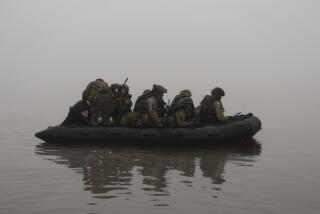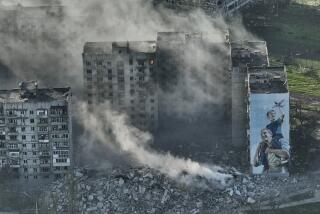Iraqis Retake Key Territory Near Basra
- Share via
CAIRO — Iraqi forces, launching their second major ground offensive in five weeks, recaptured key territory east of the southern Iraqi port of Basra on Wednesday in what appeared to be one of the most significant developments of the 7 1/2-year-old Persian Gulf War.
Iran conceded that its troops had been forced to pull back from positions around Fish Lake, about six miles east of Basra, which they captured in a costly offensive 17 months ago.
Heavy fighting was said to be continuing late Wednesday, nearly a day after the Iraqis began the move to retake the marshy swamplands east of Basra, Iraq’s second-largest city and its only gateway to the Persian Gulf.
Analysts said that if the Iraqis have really succeeded in driving the Iranians from the area east of Basra and depriving them of their last major foothold in southern Iraq, as they claim to have done, it would be the most significant of several recent setbacks the Iranians have suffered and could mark a turning point in the long-stalemated war.
It also appeared to herald a major shift in Iraqi strategy, which until last month had been criticized by Western military experts for being far too static and defense-oriented.
Iraqi communiques said the 3rd Army Corps, aided by units of the elite Presidential Guards, had driven Iranian forces back across the international frontier east of Basra in a lightning offensive code-named “On God We Depend.”
The Iraqi forces crossed the narrow Jasim and Duaji rivers south of Fish Lake, an artificial water barrier, earlier in the day and recaptured the border checkpoint of Salamchah, southeast of Basra, to “drive the enemy out of our land and back across the border,” according to one of the communiques.
Iran, which at first denied losing Salamchah, later conceded that its forces were on the retreat.
The official Iranian news agency IRNA indicated that fighting was continuing, and military analysts said the Iranians still appear to be entrenched in some Iraqi territory in the Majnoon Marshes northeast of Basra.
Major Blow
Nevertheless, the loss of what appeared to be most of the territory east of Basra, captured by Iran at the cost of an estimated 25,000 lives in January, 1987, was considered by most analysts to be a major blow to Tehran’s faltering war effort.
Coming on the heels of last month’s successful Iraqi offensive to retake the Faw Peninsula, captured by Iran in February, 1986, the loss marked a major defeat for Tehran by largely wiping out what had been its major strategic gain in the long, bitter war.
Iraq said its advancing forces had wiped out five Iranian divisions--an estimated 50,000 men--in an “epic battle” for Fish Lake. Western analysts said they had no reliable indication yet of casualties or the real extent of the fighting. Both Iran and Iraq routinely and grossly exaggerate the number of casualties they claim to have inflicted on each other.
The latest fighting was believed to have been fiercer than last month’s Iraqi offensive to retake Faw, southeast of Basra. That offensive, although it constituted a major psychological defeat for Iran, was not regarded as a commensurately large victory for Iraq because few Iranians appear to have been entrenched in Faw.
The actual extent of the fighting around Fish Lake was not yet clear. But the fact that the normally cautious Iraqis chose this moment to attack, combined with the speed with which they seem to have overrun Iranian fortifications, is another indication that Iran may be suffering a severe manpower crisis, analysts said.
Basra has long been regarded by Western and Iraqi military analysts as the main strategic target of Iran’s war effort. Yet the Iranians appear to have abandoned hope of capturing Basra.
Iraq’s recovery of most of the territory that was captured by Iran in the 1987 offensive, along with the recovery of the Faw Peninsula, largely neutralizes the Iranian threat in the south, analysts said.
More to Read
Sign up for Essential California
The most important California stories and recommendations in your inbox every morning.
You may occasionally receive promotional content from the Los Angeles Times.













